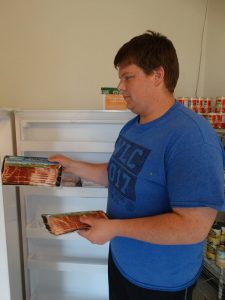When Lone Star FFA advisor Saralynn Vetter saw food overflowing from a local grocery store dumpster over Christmas break, she knew her chapter needed to do something. After much hemming and hawing, Vetter grabbed three large trash bags of the food, rushed them to her car, and eventually brought them to school for a little “show and tell” with her officer team.
Those three bags sat on an empty teacher desk in the classroom for two months and was a constant conversation starter and daily reminder of the incredible amount of food wasted in Yuma County — a region of Colorado that doesn’t have many organizations collecting extra food.
“Food security had never really been an emphasis for our chapter or school because everyone drives in; Lone Star is a school but not a town,” said Corben Muirheid, Lone Star FFA reporter. “We spent time talking about food waste and food security in Northeast Colorado and following that, we had the idea of developing a food pantry.”
The idea of hosting a pantry became a reality as the FFA chapter started talking to administrators and other teachers, who let them know there were several families in both the elementary and high school that could use extra assistance – especially since the closest place to find food for a hungry family was some 23 miles away. The Lone Star FFA office team sent out an online survey to gauge interest and well over 65 percent responded either “yes” or “maybe” to the question if they would use the bank.
The 24-member chapter had their answer and got to work. For the next four months, Lone Star FFA members developed a grassroots movement to open the food bank at Lone Star School. After finding some funding from the National FFA, a location in the school to host the service, and food to stock the pantry from the Rural Community Resource Center in Yuma, the Lone Star “Second Home Food Bank” was ready to open its doors.

“We published our grand opening on Facebook and have received an overwhelmingly positive response from community members and others across the state,” Muirheid said.
Second Home Food Bank is open daily to the public from 8 a.m. to 8 p.m. Members’ tasks include taking a bi-weekly inventory, sorting and restocking donations, cleaning the room, organizing donations, and picking up donations from Yuma and Sterling.
“Our goal is to keep the bank operational over the summer,” Muirheid said. “We will lean heavily on both members and officers that live in Yuma and Sterling to bring the donations out to school even while we are not is session.”
Originally Lone Star FFA had applied for funds for a storage container (one that is used for shipping goods overseas) to host the food bank, but didn’t get that funding.
“In hindsight, that was a blessing because we were forced to find a room in an established building,” Muirheid said. “Because of this new location, we can stay open 12 months out of the year.”
For other FFA chapters considering starting a pantry, Muirheid cautions it takes quite a bit of planning and investigation to find out what is legal or not legal in offering food to the public.
“Usually, we can find our answers on Google, but for this project, human resources (Rural Community Resource Center and Food Bank of the Rockies) were able to teach us the things we needed to know,” Muirheid said.
And while Lone Star FFA hasn’t been able to gauge the full impact the bank has on the community yet, Muirheid said it is nice to be able to respond when a staff member says, “How much food do you have? We have a family whose house burned down about three miles from the school just this morning.”
“We never would have been in a position to help on an immediate basis before,” Muirheid said.



